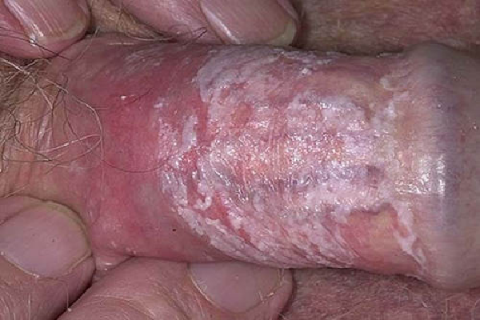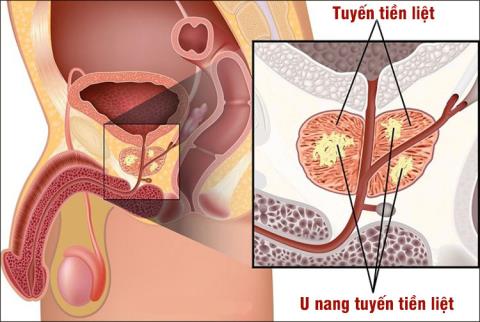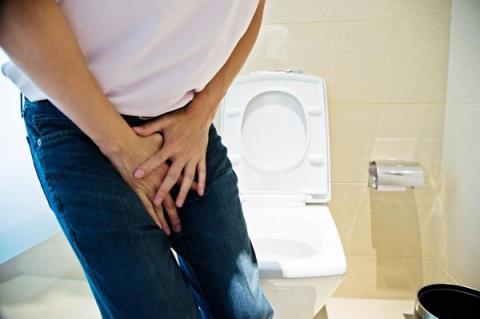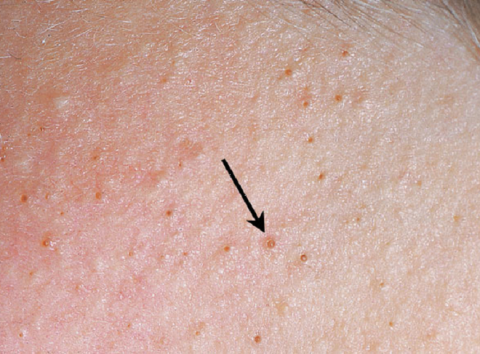Prostate cysts are also known as prostate cysts. This disease is quite common in men over the age of 50. Cysts in the prostate are usually benign in nature. The older you get, the higher your risk of developing prostate cysts. What is this disease and how dangerous is it? How to treat prostate cysts? The following article of SignsSymptomsList will cover this topic.
content
What is a prostate cyst?
The prostate gland (TTL) is an inverted, retroperitoneal gland that surrounds the bladder neck and urethra. In adults, TTL weighs about 20g.
Anatomically, the prostate is located just anterior to the rectum. The urethra runs through the center of the urethra, from the bladder to the penis, and carries urine out.
TTL has the role of secreting nutrients and protecting sperm. During ejaculation, the TTL will put these substances into the urethra and be expelled with sperm in the form of semen.
Prostate cyst is a condition in which cells in the prostate gland overgrow, thickening the gland wall, creating a cystic structure. Or it can form a septum in the bladder.
When the cysts grow larger, it will cause cystic fibrosis. These cysts can form for many reasons.

Prostate cyst is an overgrowth of prostate cells
Currently, TTL cysts are divided into 6 main types:
- TTL parenchymal cyst.
- Cyst of the ejaculatory duct.
- Abscess cyst.
- Isolated midline cyst (Müller's tube and oval sac of TTL).
- Cysts associated with parasites.
- Tumor cystic TTL.
What Causes Prostate Cysts?
With that said, prostate cysts can form for many reasons. Here are some common causes, which are:
1. Congenital prostate cyst
Cysts can form during fetal development. If so, the TTL will be disturbed causing the lumen of the duct to narrow and obstruct. Over time, waste products will accumulate in the body and form TTL cysts.
2. Prostatitis
If UTI is left untreated, it will turn into chronic inflammation. The most common cause of inflammation is E. Coli and some other Gram-negative bacteria such as Klebsiella, Proteus .
Prostatitis can also occur after performing surgical procedures such as urethral catheterization, urethral dilation, cystoscopy, etc.
Inflammatory symptoms cause prostate cells to proliferate, causing gland narrowing, fluid retention, and prostate cyst formation
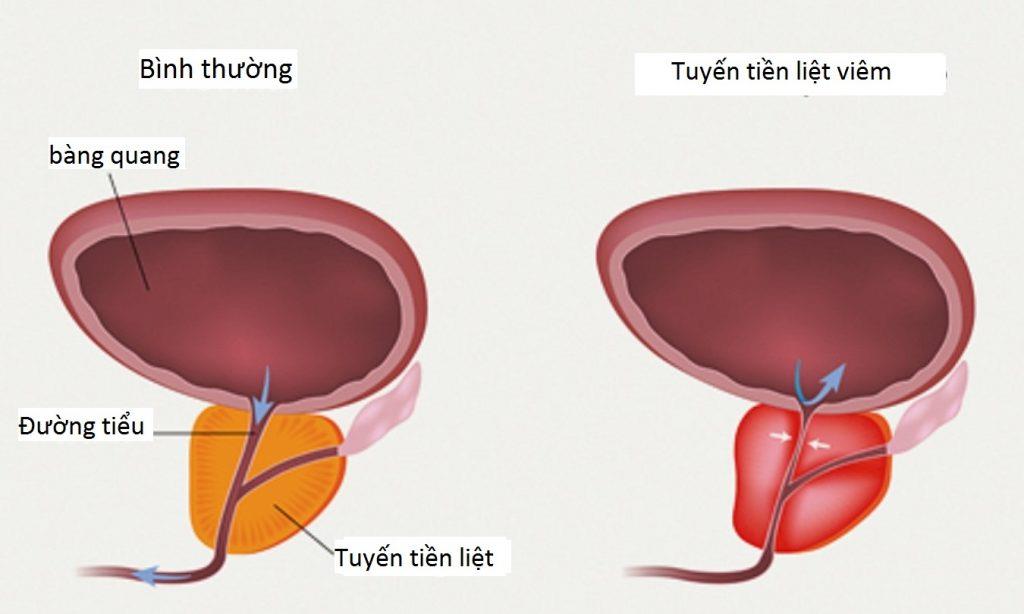
Prostatitis can lead to cyst formation
3. Due to parasitic infection
The parasites that cause prostate cysts are mainly cysts. They cause inflammation in the prostate duct and surrounding area leading to cyst formation.
4. Due to secondary causes
Prostate cysts can form due to fibrosis of the prostate's soft tissue. This causes the TTL tissues to become partially or completely blocked.
Over time, this stroma thickens and cysts form. Cysts formed in this way are usually 1-2cm in size. The most common site is the bladder neck or TTL.
Are prostate cysts dangerous?
Prostate cysts are common in middle-aged men. Is the disease dangerous is a question many people care about.
Research shows that most cases of TTL cysts are benign and not dangerous. Thyroid cysts can clear up on their own after a few months.
But there are also cases where the tumor does not heal on its own but grows larger into malignant cysts. If not detected in time, it can lead to dangerous complications for health in general and reproductive health in particular.
Some of the common complications of TTL cysts are:
- Tight anus, affecting urine excretion.
- Decreased kidney function and urinary tract diseases.
- Orchitis due to bladder, perineal, and rectum affected.
- Urinary tract infection, risk of urinary stone formation.
Signs of prostate cysts
The disease has early signs to recognize such as:
- Urinary disorders: frequent urination, urinary incontinence, difficulty urinating, frequent urination, cloudy urine...
- Impaired sexual function: Erectile dysfunction, premature ejaculation, pain during sex, ...
- Body aches and pains: or pain in the lumbar region, urethra, pelvic region, bladder, perineum, rectum.
- Tension in the anal area, pus in urine, mucus in urine...
In addition, some cases may have additional symptoms:
- Abdominal pain and pelvic pain.
- Pain in the penis, especially in the testicles.
- Mild fever, dizziness, more severe may have fainting.
- Hematuria.
How to prevent and treat prostate cysts
There are many ways to treat prostate cysts . Treatment depends on the cause of the disease. Furthermore, prevention is always better than cure. Therefore, understanding the preventive measures for cystic fibrosis is also essential.
Treatment of prostate cysts
1. Medical treatment
The most commonly used medical treatment is the use of specific drugs. This method is usually applied to mild cases.
Patients can choose to use traditional or western medicine. In general, the effects of these drugs are to reduce the size and to dissolve the cysts. It also stimulates detoxification and energy production.
For Western medicine, the use of drugs must follow the doctor's regimen. Usually the doctor will start with pain reliever, fever reducer. After that, the use of drugs injected intramuscularly, intravenously to quickly reduce the symptoms of the disease.
2. Surgical treatment
In some cases, medical treatments do not work. At this point, surgical intervention may be considered. Usually urethroscopic resection of the cyst, aspiration of tumor fluid, or drainage.
Absorb fluid in the cyst
This is considered a surgical method to completely remove the cyst. The doctor will conduct an examination and determine the position of the cyst in the prostate. After that, a needle will be used to suck all the fluid out through the anus.
This method is painful, but it will suck out the pus and eliminate the disease.
Translation
In essence, this method is similar to aspiration. But this is done by endoscopy, so the patient will have less pain.
Depending on the health status of each person, the doctor will choose to aspirate or drain the pus.
Surgery
Surgery is the last resort when the patient's condition worsens or other measures are not effective.
When the size of the cyst increases rapidly, affecting the prostate gland, the doctor is forced to surgically remove the cyst.
Worse case scenario is the need to remove the prostate gland. This will lead to infertility.
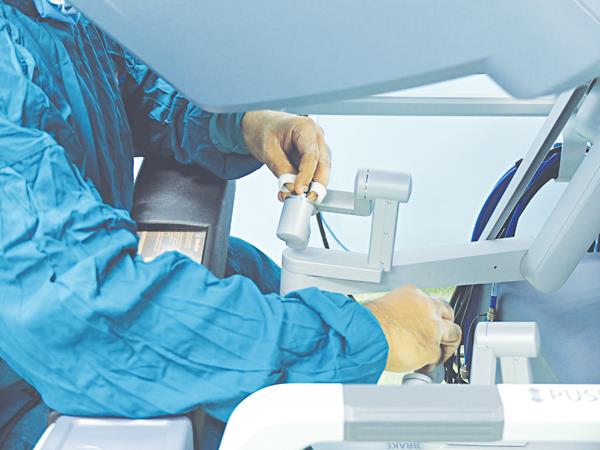
Surgery can be performed when needed
3. Treatment with physiotherapy
This is a supportive treatment. It is possible to combine physical therapy with the use of drugs to rapidly increase the effectiveness of treatment.
Physiotherapy is usually local heat methods combined with hot compresses of the lower abdomen and perineum to increase blood circulation.
If physical therapy is not possible, hot packs can be used. Apply to the coccyx or perineum for 30-60 minutes.
Physiotherapy, if performed alone, only temporarily relieves pain, but cannot cure it completely.
Prostate cyst prevention
Build a reasonable diet
To prevent and prevent recurrence of prostate cysts, men should:
- Eat a lot of food made from mussels: stir-fried mussels with chili and pepper, cooked with sour mussels...
- Eat plenty of foods rich in zinc, especially fish.
- Regularly eat vegetables, especially foods rich in vitamins A, B, C and antioxidants.
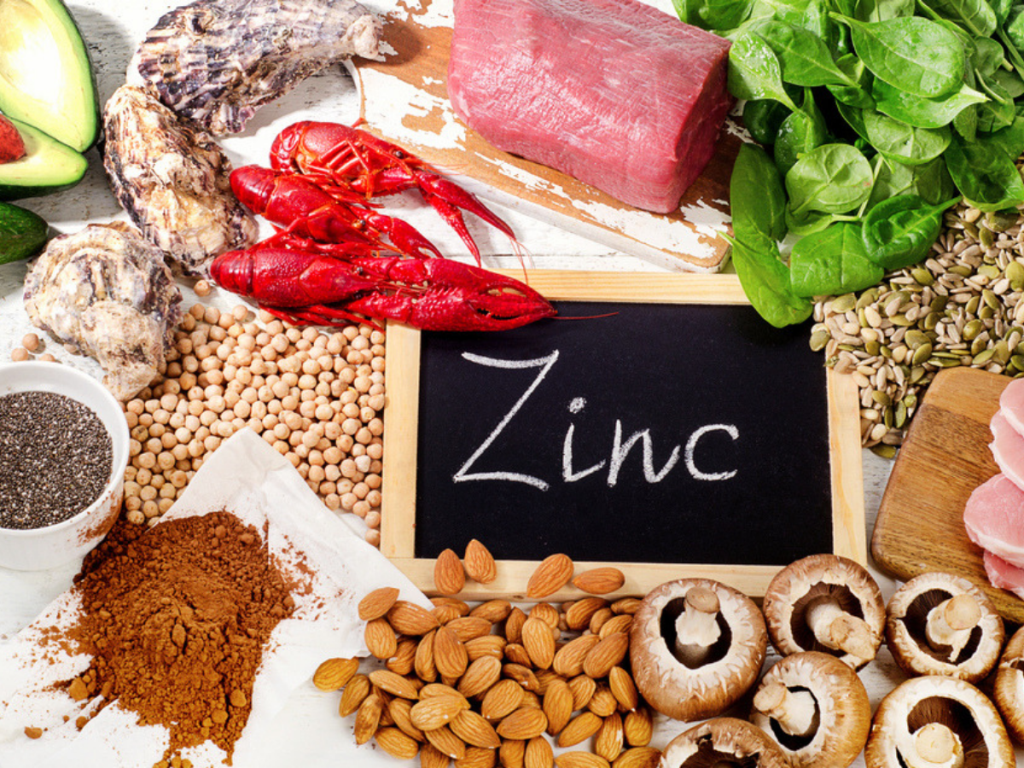
Provide zinc through daily foods for the body to prevent cystic fibrosis
Have a reasonable lifestyle
One of the factors promoting the development of prostate cysts is the lifestyle. To prevent prostate cancer, men need:
- Exercise regularly to increase resistance and prevent pathogens.
- Limit excessive physical work, sit for too long to avoid fluid accumulation, congestive bleeding.
- Have regular, reasonable sex.
- Periodic health check to screen for cysts and other diseases.
Give up bad habits
Smokers have a higher risk of disease and recurrence of the disease than the general population. It's never too late to quit smoking.
Research shows that when you give up the habit of smoking, the lungs also begin to recover and be rejuvenated. This will protect us against the risk of lung cancer.
Although prostate cysts do not seriously affect health, they cause many problems with quality of life. Especially for married life. If detecting signs of disease, men should quickly visit a doctor to promptly determine the cause and promptly treat.
